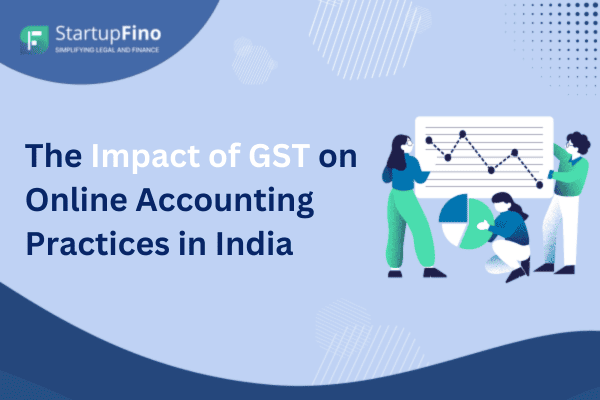The arrival of Goods and Services Tax (GST) in India brought a lot of changes to the tax regulations across different industries including accounting. Particularly, GST has altered the way accounting and bookkeeping services are offered, causing far more companies to adopt online accounting. Let us explore how GST has impacted these practices all over India, with special focus on compliance needs, adoption of technology and productivity gains in financial management.
How has GST Impacted Online Accounting Practices in India?
Here is how GST has impacted the online accounting practices in India:
Simplifying Compliance With Online Systems
Prior to the launch of GST in July 2017, businesses experienced a no. of indirect taxes – VAT, excise duty and service tax, with different rules and laws. This complexity frequently created compliance issues and administrative burden for businesses. But GST produced a unified tax system which required simplified and unified accounting.
Online accounting software’s has become necessary to handle this unified tax. These digital solutions were built to accommodate the complexity of GST calculation, maintaining records and filing returns. Online platforms offer automatic updates to tax rates and rules to keep businesses current with the most recent tax amendments without having to manually intervene.
Technology Adoption in Accounting
The switch to GST required sophisticated accounting software’s which could integrate several facets of a business’s operations. This enabled the recording of transactions, tax calculation and GST compliant invoice generation. Small and medium businesses (SMEs) which earlier used manual bookkeeping started to adopt technology to cope with these brand new demands.
Online accounting tools such as Tally, Zoho and QuickBooks emerged as popular choices which combined GST compliance with precise financial reporting. These tools include real time data access, cloud storage and mobile compatibility so accounting can be done from anywhere and at any time.
Enhancing Accuracy & Reducing Errors
Complex GST calculations and various rates for various services and products exposed manual accounting systems to errors. Online accounting software takes away these risks by automating the calculations and maintaining consistency throughout all transactions. This automation eliminates the chance of mistakes resulting in penalties or legal troubles because of non-compliance.
Also, reconciliation of purchase ledgers with GST returns, a mandatory activity under the GST regime, could be a tedious process if done manually. Online systems make this easier by matching invoices with entries to greatly reduce time and ambiguity.
Better Financial Analysis & Decision Making
Online accounting under GST has simplified compliance and increased scope of financial analysis. With all financial data central and accessible, companies can track cash flow, profitability and inventory. This data driven method allows much better decision making for companies to enhance their operations and enhance their financial status.
The analytics supplied by online accounting systems also help companies identify market trends, consumer behaviour and operational inefficiencies. This information is essential for planning and long term growth particularly in an economy such as India.
Challenges of GST for Accounting & the Way Forward
The advantages aside, the transition to online accounting under GST hasn’t been easy. The problem has mostly been the digital divide, particularly in rural areas in which access to the internet and tech proficiency are lacking.
Small businesses in these areas have trouble adopting online systems and sometimes need outside training or help programs to fill the gap.
Also, regular updates to GST rules require that online accounting software providers update their systems fast. This requires businesses to monitor regulatory changes and align their systems accordingly.
Conclusion
The impact of GST on online accounting practices in India is huge. It requires the utilization of technology, enhanced accuracy and compliance, and also strengthened financial management.
Online systems which are user-friendly and sophisticated are likely to boost in adoption further increasing efficiencies and enhancing the wellness of the Indian economy. But whether these practices continue to develop depends upon both technological advancements and the changing requirements of the business environment.






